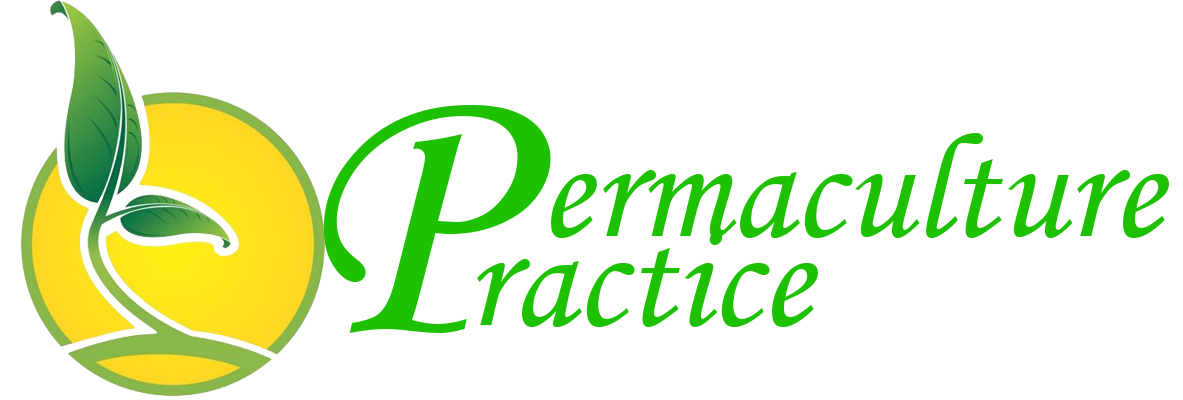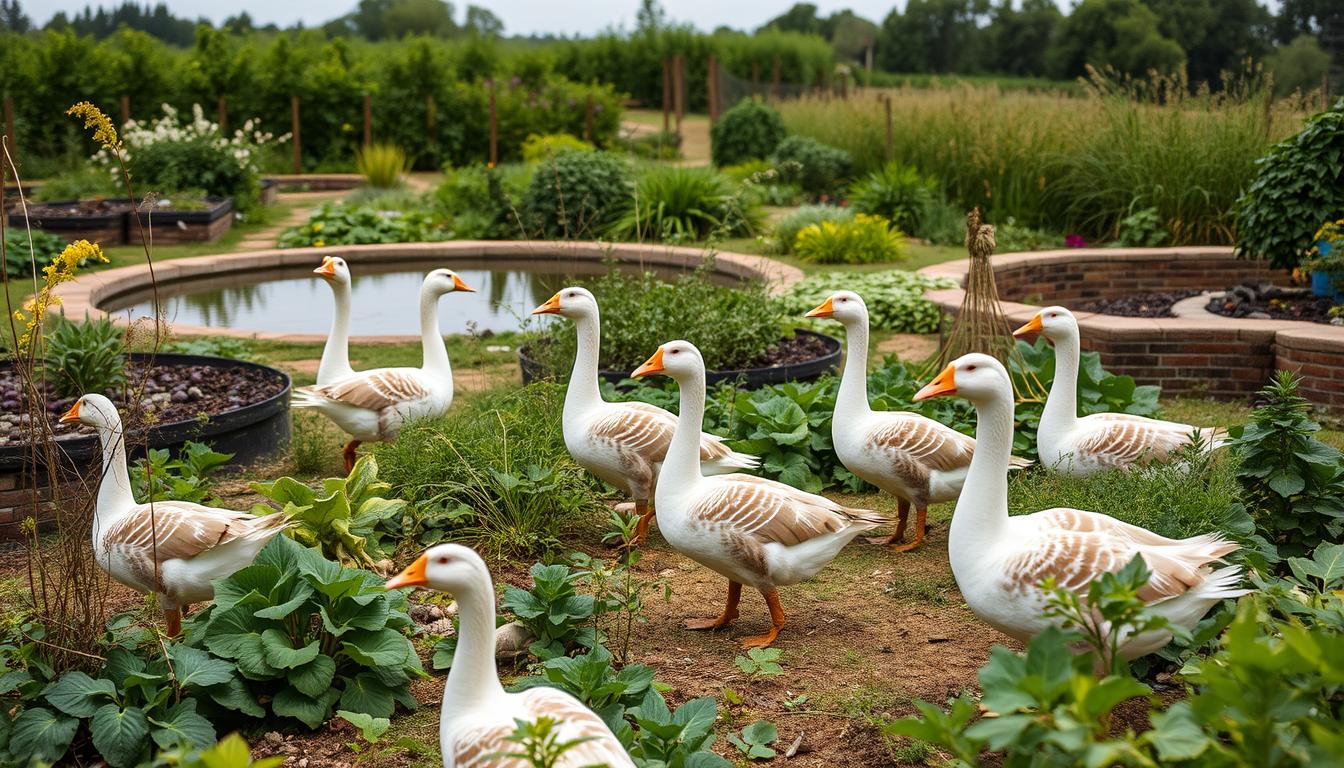Imagine a world where your backyard chickens, ducks, and geese are not just pets but essential members of your permaculture ecosystem. According to recent studies, households focusing on permaculture principles have seen a staggering 40% increase in raising these feathered friends during the shelter-in-place period. The reason? Geese, in particular, have emerged as true guardians and weed-control experts in the permaculture garden.
Geese are natural-born foragers with an insatiable appetite for grass and other green things, making them effective at controlling weeds in permaculture systems. Their voracious appetite for grass and weeds, coupled with their ability to target specific plants, makes them excellent weed management helpers. Geese provide a sustainable and environmentally-friendly alternative to chemical herbicides or labor-intensive manual weeding. They have a long history of use as weed control on farms, including in the United States, but modern chemical herbicides have rendered some breeds critically endangered.
What Are Weeder Geese?
Weeder geese are a remarkable asset in the world of sustainable weed management. These domestic geese have been specially trained to assist farmers, gardeners, and permaculture enthusiasts in controlling unwanted vegetation. By utilizing their natural grazing instincts, weeder geese can selectively remove weeds from targeted areas, reducing the reliance on harmful herbicides and labor-intensive manual weeding.
The role of weeder geese in Weed Management is well-documented. Geese are highly effective at controlling a wide range of weeds, from dandelions and chickweed to crabgrass and clover. Their ability to graze on these unwanted plants without damaging desired crops or plants makes them a valuable asset in Permaculture Weed Control and sustainable agriculture.
Explanation of Weeder Geese and Their Role in Weed Management
Weeder geese are typically employed in farm fields, vineyards, orchards, or gardens, where their grazing habits can be harnessed to manage weeds. By strategically guiding these geese to specific areas, farmers and gardeners can leverage their natural weed-eating tendencies to maintain a healthy, weed-free environment. This approach not only reduces the need for chemical herbicides but also promotes Sustainable Weed Control, aligning with the principles of Permaculture.
“Geese are extremely effective for weed control, and using them has significantly reduced my mowing and weeding obligations. They’re a fantastic, eco-friendly solution for managing unwanted vegetation.”
The versatility of weeder geese makes them a popular choice for Weed Management in various agricultural and horticultural settings. Their ability to adapt and thrive in diverse environments, combined with their natural grazing behaviors, makes them a valuable asset in the pursuit of sustainable and effective weed control.
Effectiveness of Geese for Weed Control
When it comes to sustainable weed management, Geese for Weed Control have proven to be a highly effective and eco-friendly solution. Permaculture enthusiasts and organic farmers have long recognized the benefits of integrating geese into their Biological Weed Removal strategies, and the results speak for themselves.
Geese’s voracious appetite for grass and weeds, combined with their ability to target specific plants, make them excellent Weed Control assistants. In the experience of Tyrant Farms and many other geese owners, these feathered weeders can significantly reduce mowing and weeding obligations, providing a sustainable alternative to chemical herbicides or labor-intensive manual weeding.
The Wonders of Weeder Geese
Approximately 10 geese are recommended per acre for effective lawn trimming in orchards and vineyards. Goslings, the young geese, grow at an exceptional rate compared to chicks, making them a faster and more efficient option for Sustainable Weed Management. Additionally, a ratio of 3 pounds of brewer’s yeast to 25 pounds of feed is suggested for niacin supplementation in goslings and geese, ensuring their optimal health and performance as Permaculture Weed Solutions.
“Geese imprint quickly on their caretaker, forming a strong bond. Free-range geese are generally happier and healthier, and they can effectively ward off nuisances as large as weasels and skunks.”
The Highly Pathogenic Avian Influenza outbreak in 2022 serves as a cautionary tale, leading to the loss of entire bird flocks. However, with proper precautions and biosecurity measures, geese can continue to be a reliable and sustainable Geese for Weed Control option for Permaculture enthusiasts and organic farmers alike.
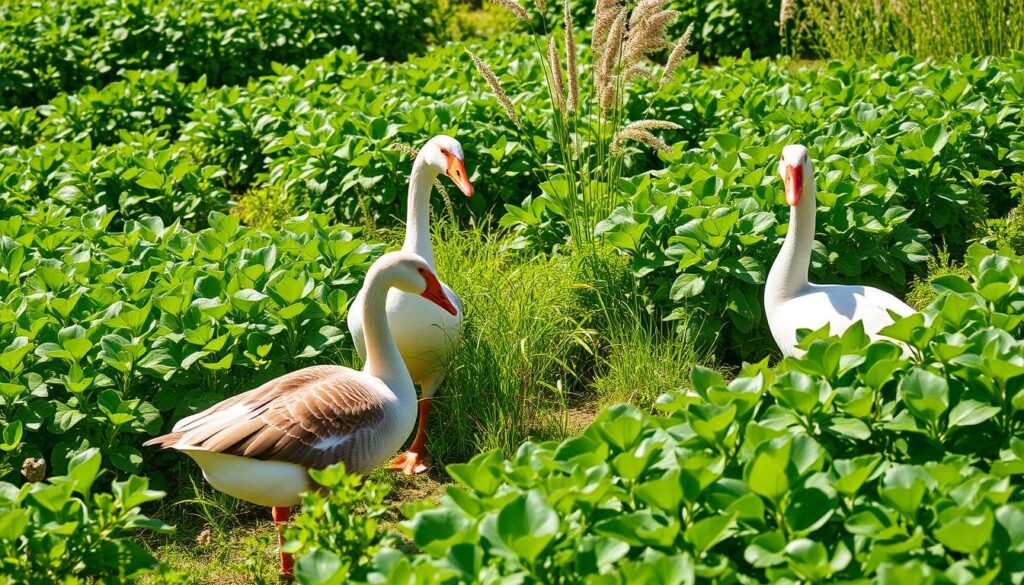
Why Do Geese Eat Grass?
Grass plays a crucial role in the diet of geese, both in the wild and in managed environments. These Grass-Eating Geese have evolved to thrive on a largely vegetarian diet, with green, growing plants serving as their primary source of nutrition.
The Goose Diet is primarily composed of fibrous vegetation like grasses. Geese possess a digestive system that is well-adapted to processing and extracting nutrients from these Goose Grazing materials. The amino acids present in the lush, green foliage are essential for Geese Nutrition, providing them with the protein they need to maintain their health and well-being.
Interestingly, the act of grazing on grass also serves a practical purpose for geese. Without teeth, they rely on their strong beaks and lamellae (small, tooth-like structures) to effectively tear and consume the vegetation. This Grass-Eating behavior helps geese maintain the health and condition of their bills, which are crucial for their overall survival and ability to forage.
“Geese are primarily vegetarians and do not need to consume animal proteins. The amino acids present in green, growing things are the primary source of protein for geese.”
So in essence, the Goose Diet’s strong emphasis on grass and other lush, green plants is a reflection of the geese’s evolutionary adaptations and their role in the natural ecosystem. By understanding the reasons behind Grass-Eating Geese, we can better appreciate the unique place they hold in permaculture systems and their valuable contributions to weed control and overall land management.
Training Weeder Geese
Incorporating Training Weeder Geese into your permaculture system can be a highly effective way to manage weeds. Geese can be trained to become expert weeders, focused on targeting specific areas or crops that need attention. The key is to start the training process early, as Goose Training is most successful when goslings are introduced to the desired weeding behaviors.
By consistently leading the geese to areas where you want them to concentrate their grazing efforts and rewarding them with treats, you can help them learn to associate certain locations with a positive experience. This reinforcement helps the geese develop a preference for consuming the weeds in those specific areas, making them highly efficient Weed Control with Geese. With patience and dedication, your flock of Permaculture Goose Training can become invaluable allies in the battle against unwanted vegetation.
“Geese can work continuously from dawn to dark, seven days a week, for weeding purposes.”
One of the benefits of using geese for Weed Control with Geese is their tireless work ethic. Geese can graze for extended periods, making them highly effective at keeping weeds at bay. By strategically placing your Training Weeder Geese in areas that need the most attention, you can optimize their impact and ensure your permaculture system remains healthy and thriving.
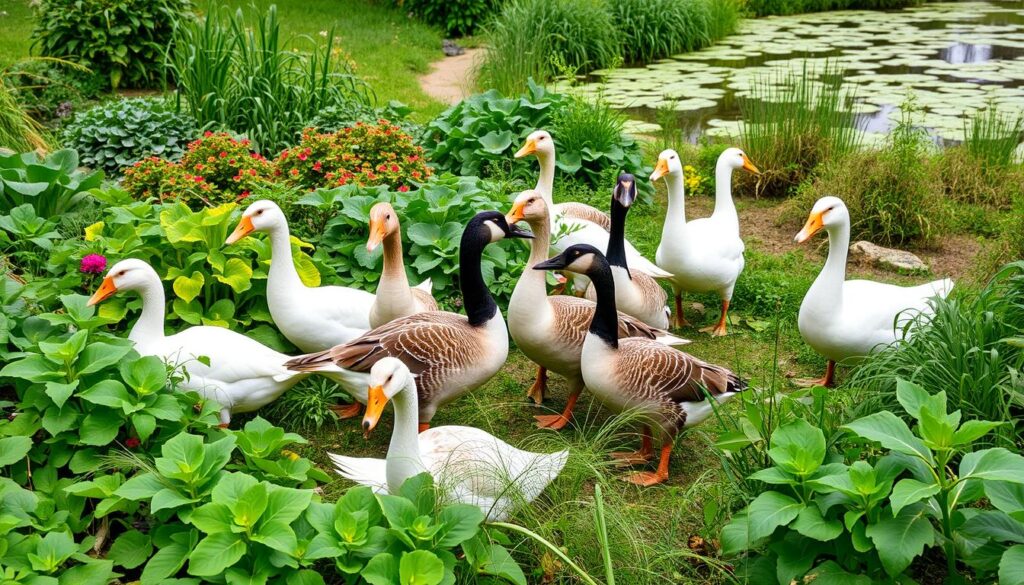
Weeds That Geese Will Eat
Geese are true Permaculture Weed Eaters, readily consuming a wide variety of common weeds. Their broad appetite makes them highly effective in managing unwanted vegetation, especially in open spaces. Geese eagerly feast on grasses, broadleaf weeds, and even some invasive species, making them valuable allies in the garden.
Among the Geese Eat Weeds that top the list of Goose-Preferred Weeds are dandelions, chickweed, clover, and crabgrass. Introducing these Weeds Consumed by Geese early can help goslings develop a taste for them, ensuring they continue to be consumed throughout the growing season.
Observations from Tyrant Farms’ orchard reveal that their resident geese happily devour a diverse array of Weeds Consumed by Geese, including dandelion flowers, bindweed, curly dock, lambs quarters, and crabgrass. This demonstrates the versatility of geese as Permaculture Weed Eaters in various landscapes.
“Geese have been companions in Danish gardens for at least a thousand years, and they are known to be ferocious grazers that do not kill other plants, making them suitable for kitchen gardens.”
Weeds That Geese Avoid
Geese are renowned for their voracious appetites and their ability to effectively control weeds in permaculture systems. However, even these tireless weeders have their preferences and avoid certain types of plants. The Weeds Geese Avoid in permaculture include toxic plants such as ragwort, buttercup, and hemlock. Geese will also steer clear of mature foxtail grasses, as the spiny tips on this invasive grass can cause internal damage if ingested.
While geese instinctively know to avoid consuming plants that are harmful to them, it’s essential for permaculture practitioners to be observant and remove any Toxic Weeds for Geese from areas where the birds graze. This proactive approach ensures the safety and wellbeing of the geese, who play a crucial role in maintaining a healthy, Weeds Geese Don’t Eat landscape.
“Geese are natural weeders, but they have their preferences. Knowing which Permaculture Weed Avoidance plants to remove can help keep your geese happy and healthy while they do their job.”
By understanding the Weeds Geese Avoid, permaculture enthusiasts can create a well-balanced system where these remarkable animals fulfill their role as guardians and weeders, contributing to the overall sustainability of the permaculture ecosystem.
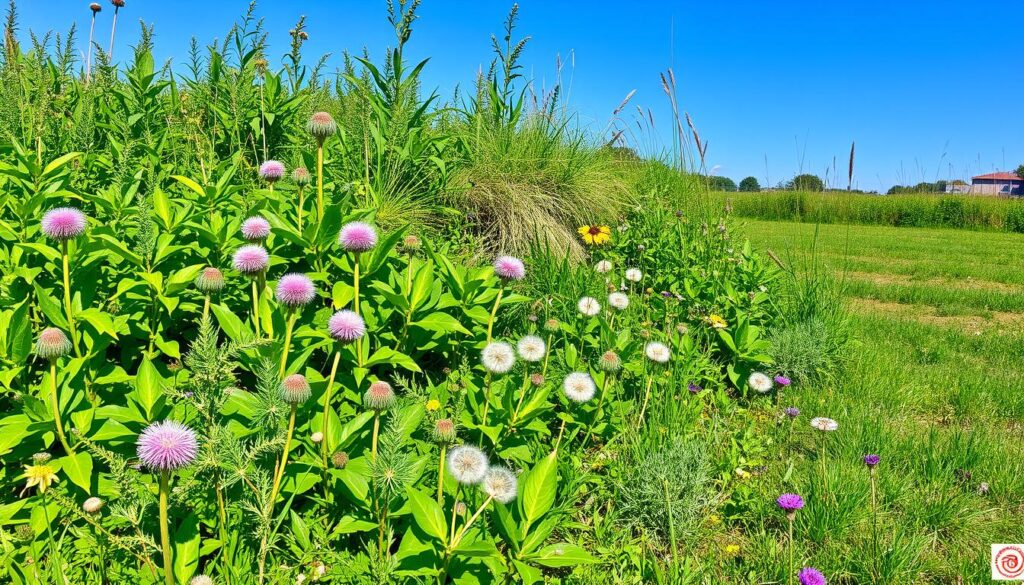
Geese in Permaculture
Geese are excellent additions to permaculture systems, providing multiple ecosystem services beyond weed control. On Tyrant Farms’ orchard, the geese mow grass, eat weeds, clean up windfalls, and fertilize the soil all at the same time. Integrating geese in permaculture can reduce the reliance on mowing, weeding, and other labor-intensive tasks, while also supporting the overall health and biodiversity of the ecosystem.
Geese as Ecosystem Helpers
Geese require minimal inputs, with an overgrown pasture providing most of their dietary needs, only requiring a small weekly portion of grains. A single matured gosling from a breeding trio of African geese yielded over 12lbs of sustainable meat by autumn. Additionally, nearly extinct Cotton Patch Geese were used on American farms during industrialization to control weeds effectively.
Beyond their role in permaculture weed control, geese can also contribute to pest management. A study conducted in Canada found that Muscovy ducks caught 30 times more flies than several types of commercial fly traps, while also targeting mosquitoes and their larvae, contributing to a significant reduction in mosquito populations. Similarly, Guinea fowl are effective at controlling tick populations along with other pests like earwigs and roaches.
“Geese are true all-rounders in the Permaculture Poultry world, providing meat, eggs, and invaluable ecosystem services.”
The benefits of integrating geese into a permaculture system go beyond just weed control. Geese can also help maintain a well-balanced and thriving Geese as Ecosystem Helpers by mowing, fertilizing, and cleaning up the land, while also contributing to pest management and overall biodiversity.
Best Goose Breeds for Weeding
When it comes to effective weed control using geese, all goose breeds possess an inherent aptitude for grazing. However, certain breeds stand out as particularly well-suited for the task of being “weeder geese.” The Chinese breed, for instance, is a lighter-weight option that is less likely to cause unwanted trampling damage. The Emden, American Buff, and Toulouse/Dewlap breeds have also been successfully utilized for weed control on Tyrant Farms’ orchards.
Ultimately, the best weeder geese will emerge from those who are introduced to targeted plant species early on, regardless of their specific breed. This early exposure helps the geese develop a preference for consuming the desired weeds, making them highly effective natural weed control agents. By incorporating the right Best Goose Breeds for Weed Control into your permaculture system, you can harness the power of these Effective Weeder Geese to keep your Goose Breeds for Permaculture thriving.
“Geese are capable of rooting out stubborn weeds, leaving armadillo-like holes in the process.”
One key advantage of using geese for weed control is their gentle nature on young plants. Thanks to their webbed feet, geese are less destructive compared to other livestock, such as chickens, making them a valuable asset in delicate permaculture settings. While geese may not be a standalone solution for all weed management challenges, they can certainly play a crucial role in maintaining a healthy, weed-free ecosystem when integrated thoughtfully.
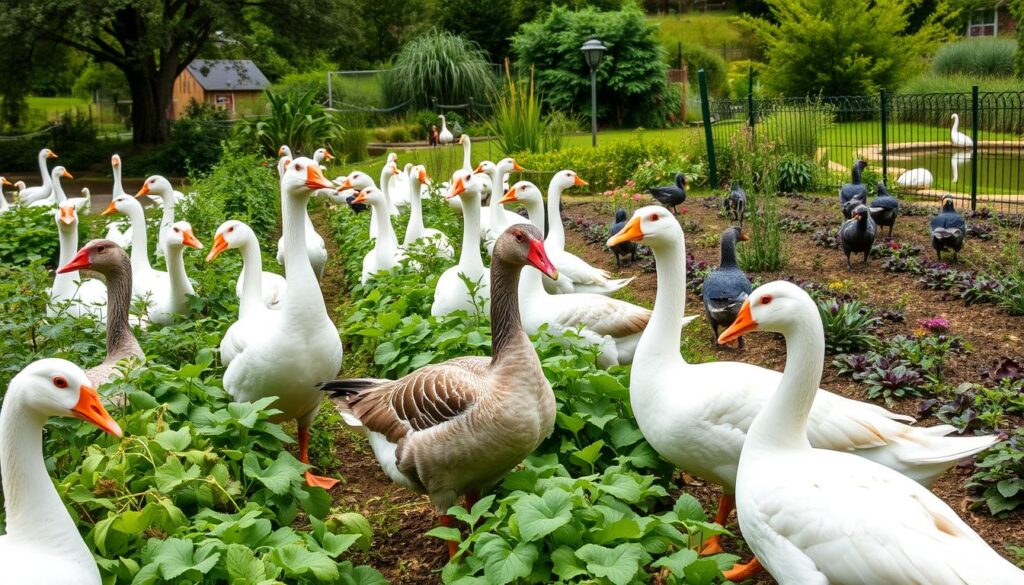
Will Geese Eat Garden Plants?
When it comes to Geese in Vegetable Gardens, it’s important to understand that these feathered friends have an insatiable appetite for tender garden plants and crops. Geese love to feast on the lush, green foliage, ripe tomatoes, and juicy strawberries that often grace our vegetable patches. However, this enthusiasm for garden fare can pose a significant challenge for gardeners aiming to protect their Geese and Crops.
Precautions for using Geese near Vegetable Gardens and Crops
To successfully incorporate Geese into your garden ecosystem without sacrificing your hard-earned harvest, it’s crucial to implement physical barriers, such as fences or netting, to safeguard your Protecting Gardens from Geese. While Geese can be excellent weed controllers in areas adjacent to your garden, you’ll need to ensure they don’t have unfettered access to your valuable vegetables and fruits.
By striking a careful balance between Geese in Vegetable Gardens and the protection of your crops, you can harness the natural weed-eating abilities of these feathered helpers while preserving the bounty of your garden. With a little creativity and diligence, you can find a harmonious way for Geese and Crops to coexist in your permaculture oasis.
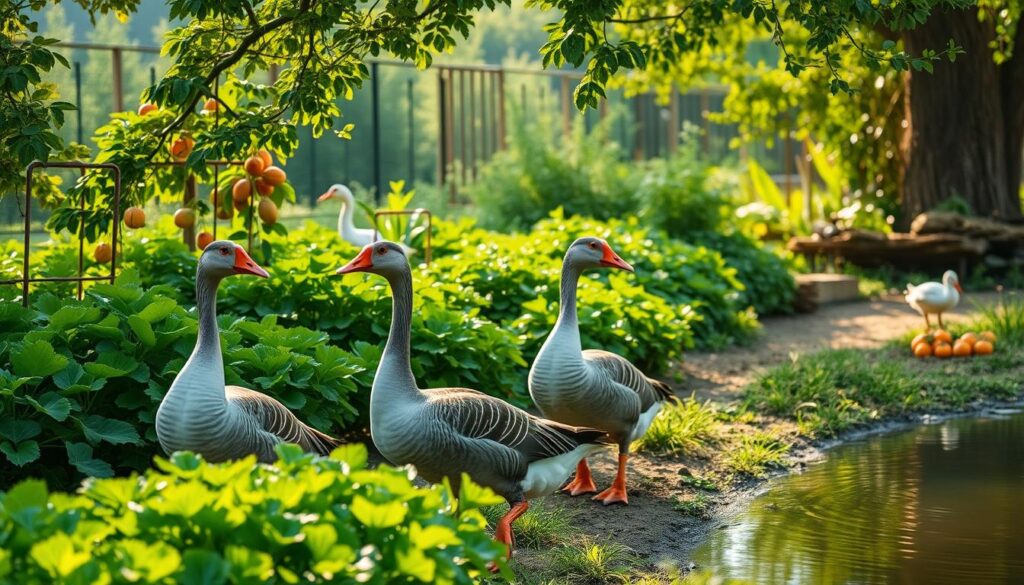
“Geese can be a gardener’s best friend, but they can also be their worst enemy if not properly managed. The key is finding the right balance to ensure your garden thrives while your feathered helpers do their job.”
Tips for Optimizing Weed Control with Geese
To ensure your geese are effective weed control allies, follow these key tips. Start by training your geese early, introducing them to the weeds you want them to target as goslings to establish their grazing preferences. Provide the right balance of supplemental feed – cut back during the growing season to encourage more foraging and Optimizing Geese for Weed Control.
Next, confine your geese to the specific areas you want them to graze using fencing or electric netting. This helps concentrate their efforts on managing weeds in your desired locations, maximizing the Effective Goose Weeding benefits. Finally, introduce the specific weed species you want them to consume early on, so they develop a taste for those problematic plants and Permaculture Weed Management with Geese.
“At Las Canadas in Huatusco, Mexico, ten geese per acre were initially used to control the weedy star grass under woody plants, which was later reduced to two geese per acre after a year for maintenance.”
By following these tips, you can harness the power of your feathered friends to create a thriving, low-maintenance landscape where weeds are effectively managed and your desired plants can thrive.
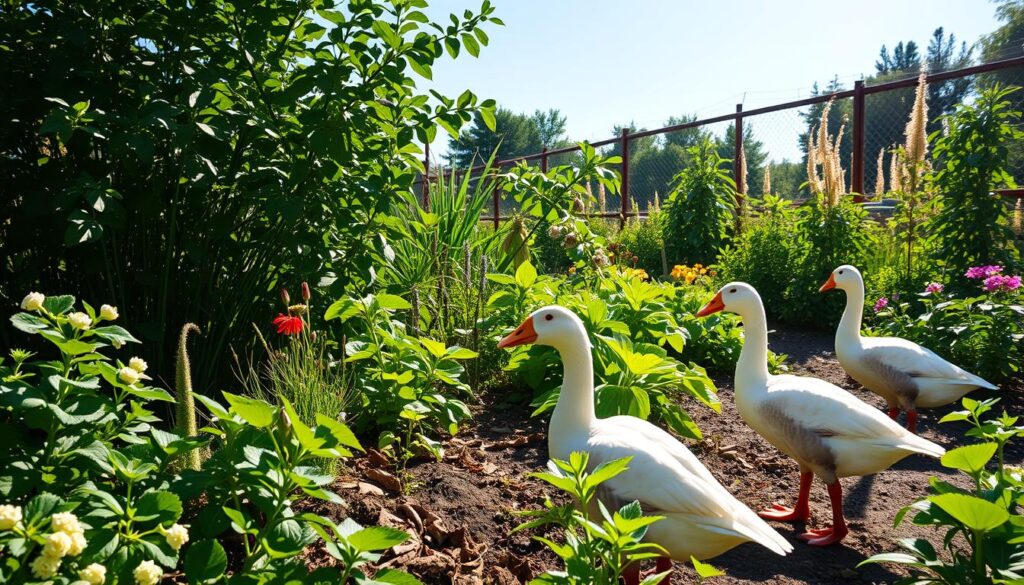
Cost Considerations for Keeping Geese
When it comes to Raising Geese for Weed Control in your permaculture system, the Cost of Keeping Geese is an important factor to consider. The initial setup costs can range from as little as $50 for adopting adult geese with existing infrastructure, to thousands of dollars if you need to build shelters, fencing, and provide a reliable water source.
Ongoing maintenance costs, such as feed, average around $97.50 per goose per year or $0.27 per goose per day, depending on your ability to let them free-range and forage. Medical costs are relatively low, as geese are generally hardy birds. However, you may want to budget for a basic first aid kit, which can cost around $100.
While Geese as Permaculture Investment may not generate significant revenue, there are potential income sources, such as selling goose eggs for $20-$50 per half dozen and ethically-sourced goose down. Though the effort required may outweigh the returns, these can help offset some of the costs.
“Geese can be a cost-effective and sustainable solution for weed control in permaculture systems.”
Overall, the Cost of Keeping Geese can be manageable, especially when you consider the long-term benefits of using them as part of your permaculture weed management strategy. With some upfront investment and ongoing care, geese can prove to be a valuable Geese as Permaculture Investment for your land.
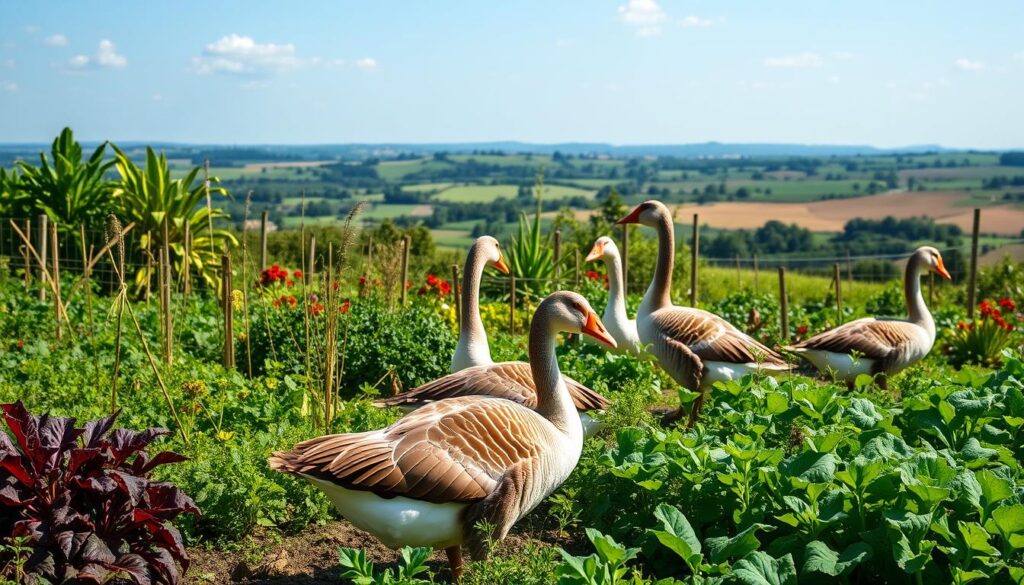
Conclusion
Geese have proven to be highly effective, sustainable, and environmentally-friendly helpers for weed control in permaculture systems. Their natural grazing instincts and ability to target specific plants make them excellent weed managers, reducing the need for chemical herbicides or labor-intensive manual weeding. By training geese, integrating them into permaculture systems, and optimizing their weed control potential, farmers and gardeners can harness the power of these versatile birds to enhance the health and productivity of their land.
Geese are well-adapted to the Scandinavian climate and have been a traditional livestock species in the region for centuries, providing essential resources such as meat, feathers, and eggs. These birds can also contribute to the sustainability of permaculture systems by grazing on grasses, weeds, and insects, aiding in weed and pest control, and their nutrient-rich manure can enrich soil fertility.
As we strive towards more sustainable and eco-friendly practices, the use of geese for Sustainable Weed Control in Geese in Permaculture systems offers a promising solution. By embracing the natural abilities of these remarkable creatures, we can reduce our reliance on harmful chemicals, promote biodiversity, and cultivate thriving, resilient permaculture ecosystems for generations to come.
FAQ
What are weeder geese?
How effective are geese for weed control?
Why do geese eat grass?
How do you train weeder geese?
What types of weeds do geese eat?
What weeds do geese avoid?
How can geese be integrated into a permaculture system?
What are the best goose breeds for weeding?
Will geese eat garden vegetables and crops?
What are the key tips for optimizing weed control with geese?
What are the cost considerations for keeping geese?
FAQ
What are weeder geese?
Weeder geese are domestic geese that have been trained to assist in weed management. These geese are typically employed in farm fields, vineyards, orchards, or gardens to graze and control unwanted vegetation.
How effective are geese for weed control?
Geese are highly effective for weed control. Their voracious appetite for grass and weeds, coupled with their ability to target specific plants, makes them excellent weed management helpers. Geese provide a sustainable and environmentally-friendly alternative to chemical herbicides or labor-intensive manual weeding.
Why do geese eat grass?
Grass constitutes a significant portion of a goose’s diet in the wild. Their digestive systems are adapted to process fibrous vegetation like grass. The amino acids present in green, growing things are the primary source of protein for geese.
How do you train weeder geese?
Training involves familiarizing geese with specific areas or crops to focus their grazing efforts. Starting them young as goslings is important, as they are more receptive to trying new things and will develop a taste for foods they are introduced to when young. Consistent training, such as leading geese to areas where you want to concentrate their efforts and rewarding them with treats, can help geese learn to associate certain areas with rewards and concentrate their grazing activities in those locations over time.
What types of weeds do geese eat?
Geese have a broad appetite for various types of weeds and excel at removing weeds in open spaces. They eagerly consume grasses, broadleaf weeds, and some invasive species. Common weeds such as dandelions, chickweed, clover, and crabgrass are among their preferred choices.
What weeds do geese avoid?
Geese will avoid toxic plants such as ragwort, buttercup, and hemlock. They will also avoid mature foxtail grasses, as the spiny tips on this invasive grass can cause internal damage if ingested.
How can geese be integrated into a permaculture system?
Geese are excellent additions to permaculture systems, providing multiple ecosystem services beyond weed control. On Tyrant Farms’ orchard, the geese mow grass, eat weeds, clean up windfalls, and fertilize the soil all at the same time. Integrating geese into a permaculture system can reduce the reliance on mowing, weeding, and other labor-intensive tasks, while also supporting the overall health and biodiversity of the ecosystem.
What are the best goose breeds for weeding?
All goose breeds have an aptitude for grazing and can be effective weeder geese. Some popular choices include the Chinese breed, Emden, American Buff, and Toulouse/Dewlap breeds.
Will geese eat garden vegetables and crops?
Yes, geese will absolutely eat garden vegetables and crops. Geese love tender shoots, including garden plants and vegetables. To use geese for weed control around a garden, you will need physical barriers, such as fences or netting, to protect your crops.
What are the key tips for optimizing weed control with geese?
The key tips are: 1) Train geese early, starting when they are goslings to establish grazing habits; 2) Provide the right amount of supplemental feed, cutting back during the growing season to encourage more foraging; 3) Introduce the specific weeds you want them to target early on to develop their preferences; 4) Confine geese to desired grazing areas using fencing or electric netting to concentrate their efforts.
What are the cost considerations for keeping geese?
The initial setup costs for keeping geese can range from (if adopting adult geese with infrastructure already in place) to thousands of dollars, depending on factors like number of geese, shelter, fencing, and water source. Ongoing maintenance costs include feed, which can average around .50 per goose per year or
FAQ
What are weeder geese?
Weeder geese are domestic geese that have been trained to assist in weed management. These geese are typically employed in farm fields, vineyards, orchards, or gardens to graze and control unwanted vegetation.
How effective are geese for weed control?
Geese are highly effective for weed control. Their voracious appetite for grass and weeds, coupled with their ability to target specific plants, makes them excellent weed management helpers. Geese provide a sustainable and environmentally-friendly alternative to chemical herbicides or labor-intensive manual weeding.
Why do geese eat grass?
Grass constitutes a significant portion of a goose’s diet in the wild. Their digestive systems are adapted to process fibrous vegetation like grass. The amino acids present in green, growing things are the primary source of protein for geese.
How do you train weeder geese?
Training involves familiarizing geese with specific areas or crops to focus their grazing efforts. Starting them young as goslings is important, as they are more receptive to trying new things and will develop a taste for foods they are introduced to when young. Consistent training, such as leading geese to areas where you want to concentrate their efforts and rewarding them with treats, can help geese learn to associate certain areas with rewards and concentrate their grazing activities in those locations over time.
What types of weeds do geese eat?
Geese have a broad appetite for various types of weeds and excel at removing weeds in open spaces. They eagerly consume grasses, broadleaf weeds, and some invasive species. Common weeds such as dandelions, chickweed, clover, and crabgrass are among their preferred choices.
What weeds do geese avoid?
Geese will avoid toxic plants such as ragwort, buttercup, and hemlock. They will also avoid mature foxtail grasses, as the spiny tips on this invasive grass can cause internal damage if ingested.
How can geese be integrated into a permaculture system?
Geese are excellent additions to permaculture systems, providing multiple ecosystem services beyond weed control. On Tyrant Farms’ orchard, the geese mow grass, eat weeds, clean up windfalls, and fertilize the soil all at the same time. Integrating geese into a permaculture system can reduce the reliance on mowing, weeding, and other labor-intensive tasks, while also supporting the overall health and biodiversity of the ecosystem.
What are the best goose breeds for weeding?
All goose breeds have an aptitude for grazing and can be effective weeder geese. Some popular choices include the Chinese breed, Emden, American Buff, and Toulouse/Dewlap breeds.
Will geese eat garden vegetables and crops?
Yes, geese will absolutely eat garden vegetables and crops. Geese love tender shoots, including garden plants and vegetables. To use geese for weed control around a garden, you will need physical barriers, such as fences or netting, to protect your crops.
What are the key tips for optimizing weed control with geese?
The key tips are: 1) Train geese early, starting when they are goslings to establish grazing habits; 2) Provide the right amount of supplemental feed, cutting back during the growing season to encourage more foraging; 3) Introduce the specific weeds you want them to target early on to develop their preferences; 4) Confine geese to desired grazing areas using fencing or electric netting to concentrate their efforts.
What are the cost considerations for keeping geese?
The initial setup costs for keeping geese can range from $50 (if adopting adult geese with infrastructure already in place) to thousands of dollars, depending on factors like number of geese, shelter, fencing, and water source. Ongoing maintenance costs include feed, which can average around $97.50 per goose per year or $0.27 per goose per day, depending on the ability to free-range. Medical costs are relatively low, as geese are hardy birds. Potential income sources include selling goose eggs and ethically-sourced goose down.
.27 per goose per day, depending on the ability to free-range. Medical costs are relatively low, as geese are hardy birds. Potential income sources include selling goose eggs and ethically-sourced goose down.
